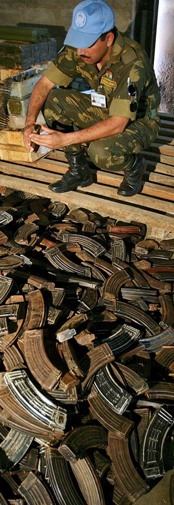
However, Kerry also rushed to appease America's influential gun lobby and their base in his subsequent speech. "Make no mistake, we would never think about supporting a treaty that is inconsistent with the rights of Americans, the rights of American citizens to be able to exercise their guaranteed rights under our constitution," Kerry said, trying to diffuse what is often harsh and arbitrary criticism. Indeed, the U.N. Office for Disarmament Affairs (UNODA) confirms the treaty does not "interfere with the domestic arms trade and the way a country regulates civilian possession."
The ATT framework will not come into effect until it has been ratified or acceded to by a total of 50 states. So far, six countries have ratified the treaty, including Germany, the third largest global arms trader. The implementation of the framework could constitute a problem for smaller, developing nations, as it requires infrastructure and resources to monitor illegal border crossings and other conduits for the proliferation of the illicit arms trade. As author Ben Coetzee from the Institute for Security Studies in South Africa pointed out in his article "Making the Arms Trade Treaty work in practice is the real challenge for Africa": "The implications of ratifying the ATT will be enormous for under-staffed and technically decrepit states."
On hopeful initiative from U.N. member states Australia and Germany, and in cooperation with UNODA, is the establishment of a multi-donor, flexible funding mechanism to address implementation challenges. The UN Trust Facility Supporting Cooperation on Arms Regulation (UNSCAR) will support lesser developed nations with their implementation of the ATT. According to UNODA, UNSCAR is a multi-donor flexible funding mechanism created to:
"-- Support the preparation for ratification and implementation of the Arms Trade Treaty, including through South-South cooperation-- Ensure the complementarities of implementation activities of the United Nations Programme of Action on small arms and light weapons (PoA)-- Improve effectiveness of assistance through better coordination, monitoring and matching of resources-- Promote increased sustainability through more predictable sources of funding."
The Programme of Action on small arms and light weapons (PoA) was based on the premise that the "illicit trade in small arms" across borders is a global problem demanding attention through the UN. However, the scope of the illicit trade turned out to be less of a concern to countries themselves than originally assumed.
According to the publication, 2012 Routledge Studies in Peace and Conflict Resolution, "the relative importance of diversion or misuse of officially authorized transfers, compared to international entirely illegal black market trafficking has been thoroughly confirmed."
The authors elaborate further that, "For most developing or fragile states, a combination of weak domestic regulation of authorized firearms possession with theft, loss or corrupt sale from official holdings tends to be a bigger source of weapons concern than illicit trafficking across borders."
Therefore, internal weapons diversion, a core premise for pursuing the Arms Trade Treaty, remains as a serious security and human rights challenge for all states.
The UNSCAR initiative has been welcomed by scholars, policymakers, U.N. member states and civil society groups, despite the fact that it has not yet been implemented, and hence data confirming successes and challenges is not yet available.
Rachel Stohl, senior associate with the think tank Stimson Center, and a contributor to the ATT process from very early stages, believes that UNSCAR might not necessarily speed up the ATT implementation process, "but will make it more effective and better coordinated." As possible obstacles she identified the various approaches for implementation practices by different member states, which will require "good communication and transparency." "The matching of necessary resources requires a lot of cooperation, not competition," Stohl explained during an interview. UNSCAR stands and falls with the willingness of donor states to finance the facility long term, she pointed out.
Amnesty International's Managing Director of Government Relations, Adotei Akwei comments on UNSCAR and the ATT process, "We need the treaty to come into force first." He believes that the trust facility will help capacity building for the ATT implementation and expects increased accountability from states towards the ATT process through UNSCAR. "If correctly funded, UNSCAR will be a critical component to the treaty having overall a greater impact," Akwei explained.
The effort around UNSCAR is aimed at creating a tool that doesn't require a high level of administration, and is structured with enough flexibility to allow immediate modification or interference if need be. A cooperation with, and a focus on local as well as regional organizations by governments within developing member states, supports that flexibility. Concretely, support can include legal or legislative assistance, institutional capacity-building, and technical, material, or financial help. Also eligible for funding are international and regional partners of CASA -- Coordinating Action on Small Arms. This group includes international organizations, NGOs, research institutes and universities.
Governments that would like to apply for funds through UNSCAR have been advised by UNODA to cooperate with eligible organizations for the design and submission of project proposals.
Such cooperation should create a level of transparency that might help guarantee the proper disbursement of acquired funds from donor nations. A clearly defined time frame, "a minimum implementation period of one year and a maximum of two years, with the possibility of a one-year extension," also serves as a tool to ensure necessary checks and balances. Interim and final narratives as well as financial reports must be submitted by recipients of funds, and a monitoring/evaluation component must be included in the proposal. The 2014 priority area of grant making will be to support the early ratification of the ATT by as many countries as possible. UNSCAR is open to receive applications for funding until Oct. 31, 2013.
